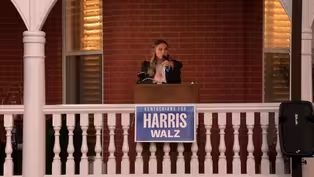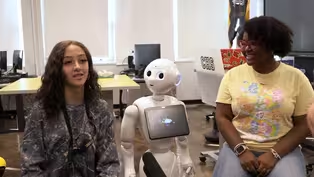
How Social Media Influences Politics
Clip: Season 3 Episode 106 | 7m 42sVideo has Closed Captions
An assistant professor at U.K. discusses how social media influences politics.
If you've been on social media lately, you likely noticed an increasing number of political ads. Christie Dutton talks with Dr. Maggie Macdonald, an assistant professor in U.K.'s Political Science department, about how social media influences politics.
Problems playing video? | Closed Captioning Feedback
Problems playing video? | Closed Captioning Feedback
Kentucky Edition is a local public television program presented by KET

How Social Media Influences Politics
Clip: Season 3 Episode 106 | 7m 42sVideo has Closed Captions
If you've been on social media lately, you likely noticed an increasing number of political ads. Christie Dutton talks with Dr. Maggie Macdonald, an assistant professor in U.K.'s Political Science department, about how social media influences politics.
Problems playing video? | Closed Captioning Feedback
How to Watch Kentucky Edition
Kentucky Edition is available to stream on pbs.org and the free PBS App, available on iPhone, Apple TV, Android TV, Android smartphones, Amazon Fire TV, Amazon Fire Tablet, Roku, Samsung Smart TV, and Vizio.
Providing Support for PBS.org
Learn Moreabout PBS online sponsorshipIf you've been on social media lately and chances are you have.
Whether that's Facebook, Instagram or TikTok, you have most likely noticed and increasing number of political posts.
Our Kristie Dutton talked to Dr. Maggie MacDonald, an assistant professor and University of Kentucky's political science department, about how social media influences politics.
Dr. MacDonald.
Much of your research centers around how politicians communicate on social media.
So tell me, is there a certain social media platform that politicians gravitate to and what are they using it for?
A good question.
So politicians are active on several social media platforms.
So what this means for the politician is that there are different potential audiences on different platforms.
And so unfortunately, the politician has to be active on all platforms all the time.
To some extent, I will say the most popular platforms for them tend to be Twitter, slash X and Facebook.
Many of them are also on YouTube and Instagram, and there are many Republican politicians who are on alt tech platforms such as True Social and in this way they try to reach different audiences to gain different pieces of information from them.
What are those different audiences for the different social media as in general?
Yeah.
So on Twitter, we tend to think that politicians are able to reach several different audiences at once, particularly not voters in their district.
So this tends to be a place where they speak to each other, where they speak to the media, both local and national print, TV, radio, etc., and also national partizan.
So people nationwide who cannot vote for them, but who might be inclined to donate to a politician that they can't vote for, but whose policies they align with.
We tend to think of Facebook as a place where politicians are more likely to actually reach their constituents, so they are more likely to communicate about community events and other things that are happening in the district.
YouTube is a very popular social media app with users, but it is actually not all that popular with politicians and that a lot of them have accounts, but they're not very good at it, frankly.
So they will have pages and they'll have, you know, clips of their news coverage or they'll have clips of them speaking on the House floor of the Senate floor.
But it tends to not be really engaging content, not the sort of content that the average YouTube user necessarily is really excited to see that will keep them coming back for more.
And then politicians tend to think of Instagram and TikTok as a way to at least try to reach younger people who the both parties really, really want to try to mobilize by engaging them where they are on the social media platforms where they're spending a lot of their time.
Yeah, and there is that learning curve with each social media platform.
And a lot of times we talk about social media algorithms.
So this basically determines who sees what.
And if a post gets seen a lot by a lot of different users or just by a few people.
So how has the social media algorithm changed political messaging?
That's a good question.
So the algorithms have changed political messaging in a few ways.
Part of this, I will say the algorithms themselves have also changed over time.
So it used to be the case on Twitter X, for example, that most of what any user tweeted, for example, a politician would primarily be seen by their followers.
Today, the algorithm will push their content to other people on the platform.
So tends to be people who have engaged with politics in some other way.
So maybe they follow a different politician and then they might be pushed content by others that they do not yet follow.
What this means for politicians is that they, one, are very aware that anyone any time could see their posts, but it also does give them incentives to try to go viral or to try and get maximize the attention that they get.
So how I have seen this in my own research is politicians are more likely to use negative language to attack each other, to get more attention, to get more engagement on the platform.
They also are less likely to focus on issues of compromise or issues where they have more agreement with the other side and instead to focus on issues where they have disagreement, to try to capitalize on the contentiousness of the issues to again, hope to get more attention.
So if that's what's being put out on social media and the public is taking this information in, does that skew our view of politics?
It often does.
So if you asked the average American what do they feel about Congress, they would say that they really dislike the institution, but they really like their member.
And so I think that's kind of emblematic that there's this sense that there's fighting in Congress and there's no compromise.
And part of that is that the politicians do not have an incentive to highlight the actual moments of bipartisanship that they do have.
Though I will admit there are fewer today than there might have been a few years ago.
So the social media as a whole.
Would you say it's helpful or harmful or a little bit of both And and.
How?
I would say it's a little bit of both.
So for a campaign for a politician today to be considered quality, they are expected to be present and active on multiple social media sites, especially if someone is running for Congress.
Right.
So they really have to be on Twitter, They have to be on Facebook.
They should have a presence on Instagram or YouTube.
And so this can be really good for them because it is a way for them to control the message.
It is a way for them to try to put the most favorable information about themselves out there for various audiences to potentially see.
This can be negative in that one.
From the campaigns perspective, this is very hard to maintain.
The average press shop for a member of Congress or for a congressional campaign.
They're very busy.
They're very stressed.
They have a lot to try to do to manage all of these platforms and that, frankly, the staff burn out a lot.
And it is just very difficult for them to maintain.
It also can lead to other negative outcomes in that as the viewer, the consumer of these politicians, it can feel overwhelming for the average American, right?
That you it you imagine.
Right.
It's so good.
I can go on Twitter and I can go on Facebook and I can go on YouTube and I can see information by this politician.
But then at some point, it becomes impossible to keep up with it.
And so a lot of people do stop engaging because they just get so overwhelmed.
And I think that is a negative.
If people are not as informed as they could be about what their politicians are doing.
And that's true.
I guess it's that double edged sword there.
Well, Dr. McDonald, thank you so much for sharing this insight with us.
This is very interesting.
Thank you so much for your time.
Of course.
Thank you for having me.
And thank you.
Kristy McDonald advises people to exercise caution When reading political content online, she recommends digging deeper into the source of the post and examine their possible motivations.
Hadley Duvall brings Harris-Walz campaign to West Kentucky
Video has Closed Captions
Clip: S3 Ep106 | 3m 35s | Hadley Duvall continues to support the Harris-Walz campaign by sharing her personal story... (3m 35s)
Video has Closed Captions
Clip: S3 Ep106 | 3m 2s | Louisville's Central High School receives new robot to help them learn. (3m 2s)
Providing Support for PBS.org
Learn Moreabout PBS online sponsorship
- News and Public Affairs

Top journalists deliver compelling original analysis of the hour's headlines.

- News and Public Affairs

FRONTLINE is investigative journalism that questions, explains and changes our world.












Support for PBS provided by:
Kentucky Edition is a local public television program presented by KET

